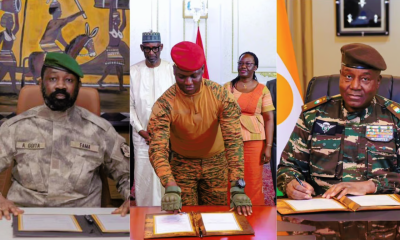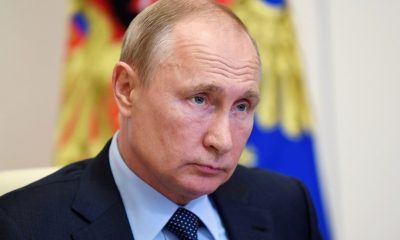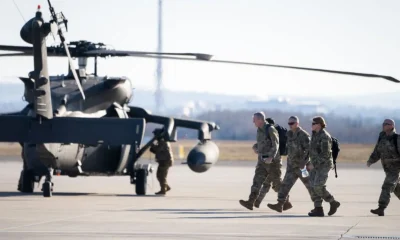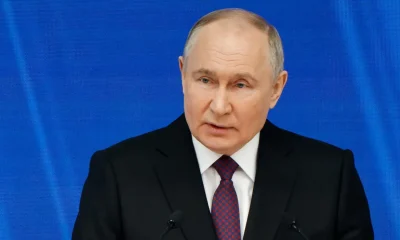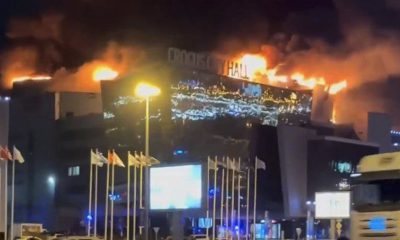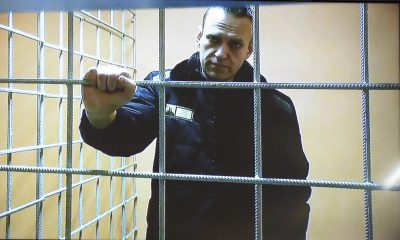
Foreign
Why Wagner Group Chief Ordered Troops To Stand Down

In a surprising twist of events, Yevgeny Prigozhin, the leader of the Wagner Group, a private Russian military company, has ordered his troops to stand down after accusing Russia’s top brass of shelling his fighters and calling for an uprising against Moscow’s military leadership.
The troops were reportedly advancing on Moscow when Prigozhin ordered them to retreat to their field camps in Ukraine to prevent the shedding of Russian blood. The announcement appeared to defuse a growing domestic crisis over the past 24 hours.

Who is Yevgeny Prigozhin and what is the Wagner Group?
Yevgeny Prigozhin is a former hot dog seller who became a billionaire businessman and a close ally of President Vladimir Putin. He is widely known as “Putin’s chef” because his catering company has served Kremlin events and Putin’s birthday parties.
He is also the founder and leader of the Wagner Group, a private military company that has been involved in various conflicts around the world, serving Russian interests and advancing Putin’s agenda.
The Wagner Group was founded in 2014 to assist in the annexation of Crimea and the war in eastern Ukraine. Since then, it has expanded its operations to other regions, such as Syria, Libya, Sudan, Central African Republic, and Venezuela.

The group has been accused of committing human rights violations, war crimes, and atrocities in these countries. The group operates in secrecy and with plausible deniability, as the Kremlin denies any official links or responsibility for its actions.

Wagner leader Yevgeny Prigozhin has been seen in leaked footage addressing prisoners in Russia
Why did Prigozhin rebel against Putin?
The exact reasons for Prigozhin’s rebellion are unclear, but some analysts suggest that it may be related to a power struggle within the Russian elite, a personal vendetta against Defense Minister Sergei Shoigu, or a miscalculation of Putin’s support.
Prigozhin claimed that the Kremlin had authorized an attack on his forces in Ukraine, where they were fighting against the government forces and supporting pro-Russian separatists. He said that he had evidence of Shoigu’s involvement in the attack and demanded his resignation. He also accused Shoigu of corruption, incompetence, and treason.
RELATED: Putin Vows Harsh Punishment for Wagner Group Mercenaries
Prigozhin said that he had no intention of overthrowing Putin or harming Russia, but rather wanted to stop the “evil” of Moscow’s military leadership. He said that his troops were loyal to Russia and ready to defend it from any external threats. He also said that he had support from other patriotic forces within Russia, such as veterans, nationalists, and Cossacks.
[the_ad id=”41670″]
How did Lukashenko get involved?
Belarusian President Alexander Lukashenko, who has been facing mass protests and international pressure since his disputed re-election in 2020, played a key role in mediating between Prigozhin and Putin. Lukashenko said that he had discussed the issue with Putin by phone and offered his services as a peacemaker.
He said that he had contacted Prigozhin and persuaded him to halt his march on Moscow and return to Ukraine. He said that he had proposed a settlement that contains security guarantees for Wagner troops and a peaceful resolution of the conflict.
Lukashenko’s involvement may be seen as an attempt to boost his legitimacy and influence in the region, as well as to secure Putin’s support for his own regime.
Lukashenko has been relying on Russia’s backing to survive the political crisis in his country and to resist Western sanctions and pressure. He has also been accused of orchestrating a forced landing of a Ryanair flight in Minsk in May 2021 to arrest a dissident journalist on board.

Putin Vows Harsh Punishment for Wagner Group Mercenaries
What are the implications of this event for Russia and the world?
The event has exposed the fragility and volatility of Russia’s political system and security apparatus, as well as the potential risks and challenges posed by private military companies.
It has also raised questions about Putin’s control over his allies and subordinates, as well as his ability to deal with domestic dissent and unrest.
The event may have damaged Putin’s image and reputation both at home and abroad, as well as weakened his position in negotiations with other world leaders.
The event may also have implications for the ongoing conflict in Ukraine, where Russia has amassed tens of thousands of troops near its border and threatened to intervene if Kiev tries to reclaim its territories from the separatists.
The event may have disrupted Russia’s plans and strategies in Ukraine, as well as created new opportunities for dialogue and diplomacy. The event may also have implications for other regions where the Wagner Group operates, such as Africa and the Middle East, where its activities may be affected by the internal turmoil and uncertainty within the group.
The event may also have implications for global order and security, as it may trigger new tensions and conflicts between Russia and other countries, such as the US, NATO, and the EU.
The event may also increase the demand and supply of private military services, as well as the challenges and risks associated with their regulation and oversight.
The event may also highlight the need for more cooperation and coordination among the international community to address the threats and challenges posed by private military companies and their activities.

Why Wagner Group Chief Ordered Troops To Stand Down


